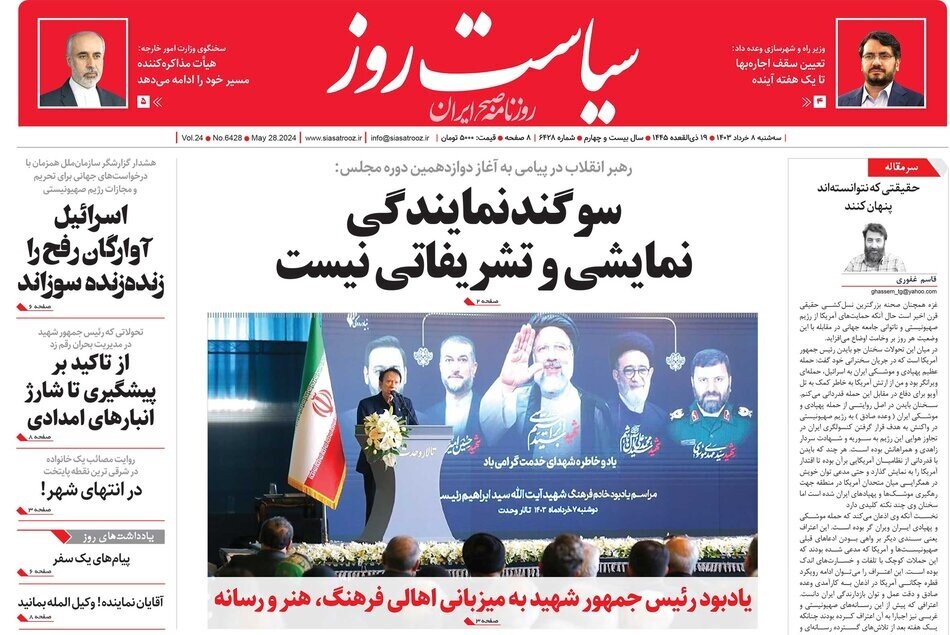Biden admits inability of sanctions

TEHRAN - In its editorial, Siasat-e-Rooz analyzed Biden's confession that Iran's missile and drone attack was devastating and wrote: First of all, this confession is another proof of the falsity of the previous claims of the Zionists and the United States.
They claimed that these small attacks have been with little damage. Second, America's help to Israel in intercepting Iranian missiles and drones was an official acknowledgment of the collapse of the Zionist regime's deterrence power and being ineffective its missile systems against the authority of the resistance. Biden's words are another acknowledgment of the inability of U.S. sanctions and threats against Iran's deterrence power. Biden's words about the True Promise operation are not an indication of America's power but was a sign of the collapse of the deterrence power of America, the Zionist regime and even their allies and supporters against the authority of missiles and drones and the will of the resistance front. This is a great disgrace for America and its allies, and also it reveals the undeniable role and position of Iran in the equations of the new world order, including in the realization of stability and security in the region.
Kayhan: Chasm in the West is indicative of Iran's great victory
In a commentary, Kayhan addressed the opposition of the United States to the issuance of a resolution by three European countries and wrote: According to the diplomats present at the negotiations, the Biden administration is seeking to prevent the escalation of tensions with Tehran before the American presidential election, and for this reason, it has put European allies under pressures to stop criticizing Iran for its progress in its nuclear program. The United States has pushed against a tough IAEA resolution, but the previous disagreements over how to handle Iran's nuclear activities are between Washington and the Europeans. British and French officials have told Washington that they want to continue with a tough resolution. It is unclear whether the Europeans will do this, but according to the American media, if they propose a resolution that fails, it will be a major diplomatic achievement for Tehran, indicating that Western pressure on Iran is dying.
Iran: Desire to resume relations with Tehran
In a note, the Iran newspaper pointed out the approach of Hossein bin Abdullah, the Crown Prince of Jordan, to reduce tension and establish a constructive relationship with Iran and said: The improvement of regional relations, especially Arab countries in the 13th government, led to the resumption of relations with countries such as Saudi Arabia, Kuwait and Egypt, and this desire was recently expressed by the Crown Prince of Jordan. The case of relations between Iran and Jordan was put on the agenda of the 13th government. The first significant signal sent by Jordan was this government's opposition to creating a military-political coalition against Iran in the region. After the October 7 war, Arab observers emphasized that with the resumption of relations between Tehran and Riyadh, the Jordanian embassy in Iran must resume its work after 7 years of severance of relations. The messages and positive signs of the Arab countries, which had previously defined the basis of their relationship with Tehran in confrontational alignment, can be evaluated following the occurrence of the "True Promise" operation and the transformation in the equations of power deterrence in the Middle East. Now, with the support of its military power, Iran has put the idea of ??intra-regional cooperation on the table of all countries in the region and has defeated the ineffective efforts to prevent this process through the interventions of Western actors.
Donya-e-Eqtesad: A meeting without a resolution?
In an article, Donya-e-Eqtesad dealt with the upcoming meeting of the Board of Governors. It wrote: Earlier this month, Rafael Grossi, Director General of the International Atomic Energy Agency, visited Iran to improve cooperation between the parties and asked Tehran to take significant steps before the June meeting of the Board of Governors to show its goodwill. Of course, there has been no significant change yet. The U.S. officials held their first talks with Iranian officials in Oman to manage tensions with Tehran. According to people familiar with the talks, the indirect talks, which included the movement of Omani officials between the parties, were about regional and nuclear issues. Until now, the censure resolution has been postponed and the Board of Governors believes that diplomatic efforts should be made to control Iran's nuclear program to lift sanctions. According to Kelsey Davenport, director of nonproliferation policy at the Arms Control Association, the Board of Governors should send a message to Iran that there will be consequences for non-cooperation with the agency. But it should be part of a broader strategy. The goal should be to pressure and encourage Iran to cooperate with the Agency and expand access.

Leave a Comment